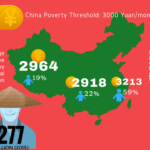China’s Middle Class: An Emerging Market
China’s Middle Class and its consumption pattern
The World has witnessed China’s rapid economic growth since the beginning of 21th century. Meanwhile, its prosperous economy enables great numbers of people to join China’s middle Class, who are more affluent and have greater personality. The Chinese emerging middle-class consumers bring many opportunities to foreign companies in China. Thus, only understanding their consumption culture could help them enter China market successfully.
Definition and classification of China’s middle class
It is necessary to identify clearly the need of the middle class in China in order to meet the consumers’ demand. The State Statistical Bureau are including within the middle class, Chinese families that are earning from 60,000 to 500,000 CNY. However, social status and education level are also significant criterions according to experts as new middle-class people are coming from late 1980s generation, they tend to be high educated with a decent job. China’s middle class could be divided into two group: the mass middle class and the upper middle class. The mass middle class with a lower income are focusing on a product that is functional and that is durable while upper middle class pay more attention to the brand itself.
The rise of China’s middle class
China’s middle class is burgeoning at a rapid pace. China has more than 100 million middle-class people nowadays. It’s predicted that by 2022, the scale of China’s middle class will rise to 600 million, which accounts for 76% of urban families and 45% of total population. With the enrollment expansion in the universities since 1999, the young generation is lucky to have more chances to receive higher education. Meanwhile, China is accelerating its process of urbanization, which enables these people with the skill to find a good job and settle down in big cities. With a continuous economic growth in China and import of foreign products, these new white collars have rising disposable income with an open mind. Big cities like Beijing and Shanghai have a great number of middle-class people, second and third-tier cities had seen a growing number of its middle-class people, in recent years, this is due to the development of the transportation in China and the high cost of living in big cities.
Consumption pattern of China’s middle class
 As for mass middle class, people are looking for better quality and service as their incomes rise but they also remain sensitive to price. They often shop around and then buy products with the best quality-to-price ratio. Unlike the upper middle class, they spend relatively more money on daily necessities. Meanwhile, they also spend a lot of money in entertainments in order to improve their quality of life. However, they often set a fixed budget for their leisure consumption, in this industry, they will prefer to choose a medium product in order to respect the budget allow for those expense. For instance, according to Daxue recent survey, they will prefer to book clean and standard three-star hotel when travelling rather than a famous luxury palace.
As for mass middle class, people are looking for better quality and service as their incomes rise but they also remain sensitive to price. They often shop around and then buy products with the best quality-to-price ratio. Unlike the upper middle class, they spend relatively more money on daily necessities. Meanwhile, they also spend a lot of money in entertainments in order to improve their quality of life. However, they often set a fixed budget for their leisure consumption, in this industry, they will prefer to choose a medium product in order to respect the budget allow for those expense. For instance, according to Daxue recent survey, they will prefer to book clean and standard three-star hotel when travelling rather than a famous luxury palace.
As for upper middle class, they seldom care about pricing but lay emphasis on premium product. They have abundant basic necessities so that they seek after a higher spiritual life. They spend more money and time on leisure activities like cinema and travelling. They are also willing to join a gym or cultural clubs in order to expand their networks. Visiting art exhibition or going to the concert are also regarded as a symbol of a premium standard of living. Compared to mass middle class, they have more desire to purchase high-tech products. Indeed, they tend to be aware of updated worldwide technology. They pursue big brand to show their status and taste and, therefore, most of them contributes greatly to the sales of the foreign luxury brand. They are also very concerned about the international trends in order to stay up to date about fashion and style. In brief, upper middle class are fond of equipping themselves with fashion and refinement.
If you enjoyed reading this article and would like to know more about China’s market, contact us at dx@daxueconsulting.com














